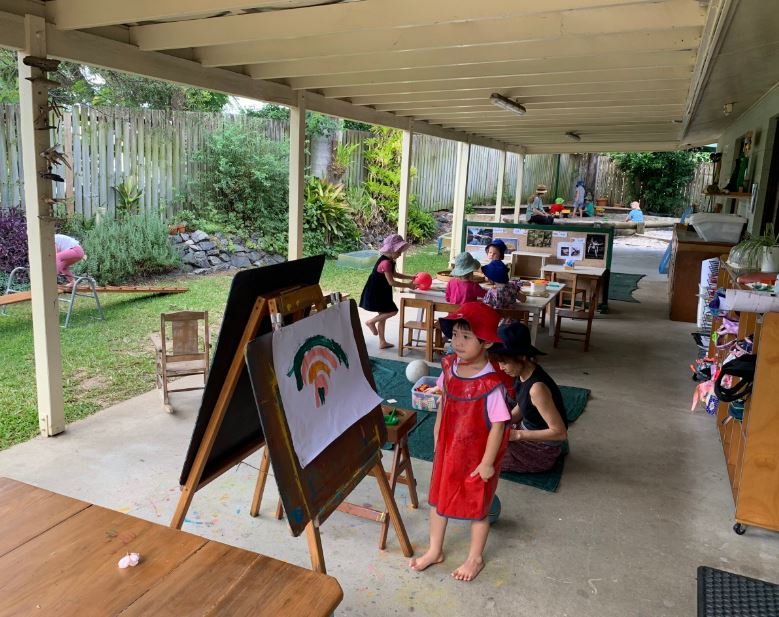In the fast-paced digital age, where screens often dominate a child's leisure time, the importance of outdoor play cannot be overstated. Outdoor play is not just a break from indoor routines; it is a crucial component of a child's holistic development. At Montessori Australia, the commitment to a well-rounded education extends to the outdoors. In this article, we'll explore the significance of outdoor play in a child's growth and showcase the diverse array of outdoor learning tools available on the website.
1. Outdoor Play and Child Development
1.1 Physical Development

Outdoor play provides a natural setting for physical activities that promote the development of gross and fine motor skills. Climbing, running, jumping, and playing with outdoor equipment contribute to muscle strength, coordination, and overall physical well-being.
1.2 Cognitive Development

The outdoor environment stimulates cognitive development by offering a multisensory experience. Natural elements like sunshine, wind, and the feel of grass underfoot engage a child's senses, fostering curiosity, exploration, and the development of spatial awareness.
1.3 Social and Emotional Development

Interactions in outdoor settings encourage socialization, cooperation, and teamwork. Children learn to navigate social relationships, negotiate, and resolve conflicts, fostering emotional intelligence and resilience.
1.4 Creativity and Imagination

The vast and dynamic outdoor space becomes a canvas for imaginative play. Whether building forts, creating nature-inspired art, or engaging in pretend play, children develop creativity and problem-solving skills through unstructured outdoor activities.
2. Montessori Australia's Outdoor Learning Tools
2.1 Nature Explorer Kit

-
-
Purpose: Encourage a deep connection with nature through exploration. The kit includes tools for observing insects, magnifying glasses, and nature journals.
-
Benefits: Fosters curiosity about the natural world, promotes scientific observation skills, and encourages journaling for language development.
-
2.2 Gardening Tools for Kids

-
-
Purpose: Engage children in the joy of gardening, teaching them about plants, growth cycles, and the responsibility of caring for living things.
-
Benefits: Enhances fine motor skills, promotes an understanding of the environment, and instills a sense of responsibility.
-
2.3 Outdoor Musical Instruments

-
Outdoor Musical Instruments Set
-
Purpose: Create an outdoor music space to stimulate auditory senses and encourage creative expression through sound.
-
Benefits: Develops auditory discrimination, promotes rhythm and coordination, and introduces children to the joy of making music.
-
2.4 Balance Beam and Stepping Stones

-
Balance Beam and Stepping Stones
-
Purpose: Provide opportunities for physical challenges that enhance balance, coordination, and spatial awareness.
-
Benefits: Develops gross motor skills, fosters a sense of balance and body awareness, and encourages risk-taking in a safe environment.
-
2.5 Insect and Butterfly Houses

-
Insect House and Butterfly House
-
Purpose: Create habitats for insects and butterflies, facilitating observation and learning about the natural world.
-
Benefits: Encourages an understanding of ecosystems, promotes responsibility for the environment, and enhances scientific curiosity.
-
3. Tips for Creating a Montessori-Inspired Outdoor Space
3.1 Natural Elements

Incorporate natural elements like rocks, logs, and plants. These elements provide opportunities for exploration and connect children with the outdoor environment.
3.2 Child-Accessible Tools

Ensure that outdoor tools and equipment are child-sized and easily accessible. This promotes independence and empowers children to engage in activities without constant adult intervention.
3.3 Unstructured Play Areas

Designate areas for unstructured play where children can engage in open-ended activities. These spaces encourage creativity, imaginative play, and collaboration.
3.4 Incorporate Art and Creativity

Set up an outdoor art station with materials like chalk, paint, and natural materials. This promotes creativity and allows children to express themselves in different ways.
3.5 Garden and Planting Areas

Dedicate a space for gardening activities. Involve children in planting, watering, and caring for plants, fostering a connection with nature and teaching responsibility.
Conclusion
Outdoor play is not just a break from indoor routines; it's a fundamental aspect of childhood development. Through unstructured play, exploration, and engagement with nature, children develop physically, cognitively, socially, and emotionally. At Montessori Australia, the commitment to holistic education extends to the outdoors. The showcased outdoor learning tools are carefully curated to enrich a child's outdoor experience and align with Montessori principles.
By incorporating these tools and following Montessori-inspired outdoor play principles, you can create an environment that supports your child's growth and development. Outdoor play becomes a journey of discovery, fostering a lifelong love for nature, learning, and exploration. Visit Montessori Australia to explore the full range of outdoor learning tools and embark on a journey to provide your child with the enriching benefits of outdoor play.

